Navigating the journey of Alzheimer’s can be daunting, especially when faced with the added complexity of seizures. “It is crucial to understand the interlinked condition of Alzheimer’s and seizures to manage and treat it effectively,” says Dr. Gurneet Singh Sawhney. He is considered one of the best neurosurgeon in Mumbai, India, who offers advanced, customized care for such complex health challenges.
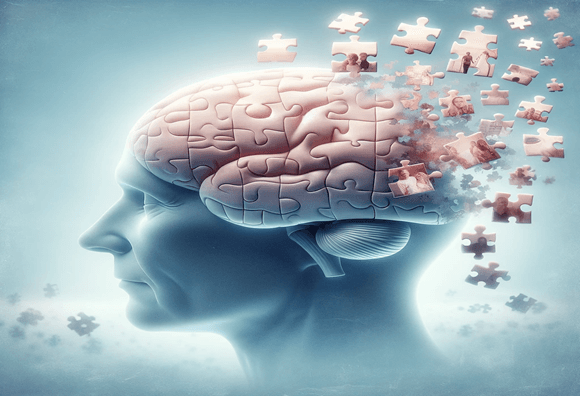
Dr. Sawhney ensures each patient receives the care and attention they deserve. His approach is about managing symptoms and understanding the patient’s health landscape. This holistic perspective is essential in crafting effective Alzheimer’s seizures treatment plans.
In this blog, we will explore the connection between Alzheimer’s and seizures, its causes, diagnosis, and management strategies.
First, let’s understand,
What exactly is Seizure and Alzheimer’s Disease, and How Does it Affect the Brain?
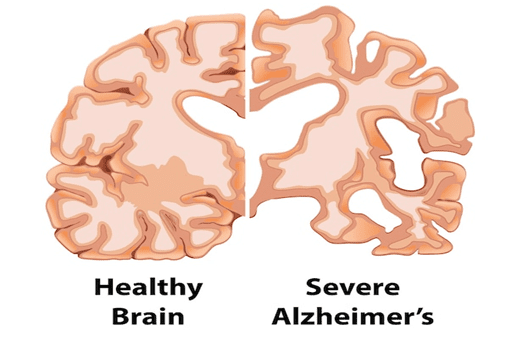
A seizure is an abrupt and uncontrollable surge of electrical activity within the brain, leading to alterations in behavior, movements, emotions, and levels of consciousness. Epilepsy is usually diagnosed by having two or more seizures that happen at least 24 hours apart and have no known cause.
Alzheimer’s disease is a progressive brain disorder. It affects memory and thinking skills. Alzheimer’s is a form of dementia. Statistics reveal that around 70% of dementia cases are due to Alzheimer’s. This degenerative condition primarily targets the brain’s neurons. It disrupts the vital communication channels.
As these neurons deteriorate, neurological changes ensue. It impacts memory, thinking skills, and basic functional abilities. It can also increase the risk of seizures. This happens because Alzheimer’s causes changes in brain structure and function. It makes the brain more susceptible to abnormal electrical activity.
Are you or a loved one experiencing back pain after a seizure? Please consult a neurosurgeon who can help identify the underlying causes and recommend effective treatments.
Curious about the signs of seizures in Alzheimer’s? Let’s uncover them.
Signs of Seizures in Alzheimer’s Patients
There is an often-overlooked aspect of Alzheimer’s: seizures. While not widely recognized, seizures occur in a significant number of Alzheimer’s patients. Recent studies show that up to 22% of Alzheimer’s patients experience seizures, particularly in advanced stages. Hence, we need to understand more about Alzheimer’s than just memory loss. It is also essential to consider the critical neurological symptoms.
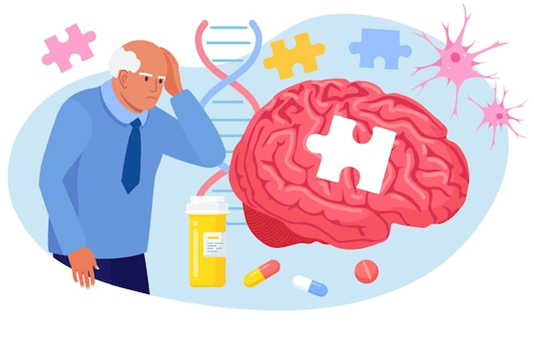
Some of the signs of seizures in Alzheimer’s may include:
- Sudden Confusion:
A sudden, unexplained increase in confusion or disorientation could signal a seizure.
- Involuntary Movements:
Watch for subtle, involuntary movements such as twitching or jerking of limbs.
- Staring Spells:
Brief periods where the person seems to ‘zone out’ or stare into space without responding.
- Sensory Disturbances:
Unusual sensations or experiences, like smelling something that isn’t there.
- Memory Lapses:
Sudden, unexplained gaps in memory or periods of forgetfulness.
- Mood Swings:
Abrupt changes in mood or behaviour that are out of character.
- Fatigue or Sleepiness:
Excessive tiredness after a confusing episode could imply a postictal state (after a seizure).
“Remember, these signs can be subtle and easily overlooked,” cautions Dr. Gurneet Singh Sawhney. “Recognizing these signs is crucial for effective management,” he adds.
“Detecting and managing Alzheimer’s disease as early as possible can help improve the quality of life for patients.”
But what exactly is the connection between Alzheimers and seizures? Let’s find out.
The Link between Alzheimer’s and Seizures
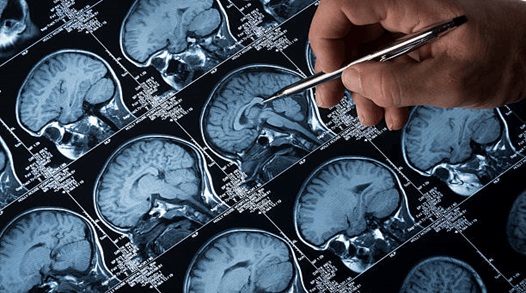
Understanding the link between Alzheimer’s and seizures is critical to comprehending this complex condition. Studies suggest that the risk of seizures in Alzheimer’s patients is higher.
Alzheimer’s disease progressively damages brain cells. This causes changes in brain structure and function. It leads to a disruption in electrical activity. This disruption can trigger seizures, particularly in the later stages of the disease.
The brain, compromised by Alzheimer’s, becomes more susceptible to these electrical misfires. Thus, it creates a direct connection between Alzheimer’s and seizures. These seizures can range from mild to severe. They might go unnoticed in the early stages. Recognizing the signs of seizures in Alzheimer’s patients is paramount.
What can you do? Stay informed and proactive. Regular check-ups, discussing concerns with your doctor, and monitoring any behaviour or physical health changes are vital steps.
“Remember, each individual’s experience with Alzheimers and seizures can vary. So, personalized care plans are essential,” mentions Dr. Gurneet Sawhney.
Are you looking for effective Alzheimer’s seizure treatment in Mumbai? Book a consultation with Dr. Gurneet Sawhney and take the first step towards improved well-being.
Now, let’s explore the Causes of Seizures in Alzheimer’s
Causes of Seizures in Alzheimer’s
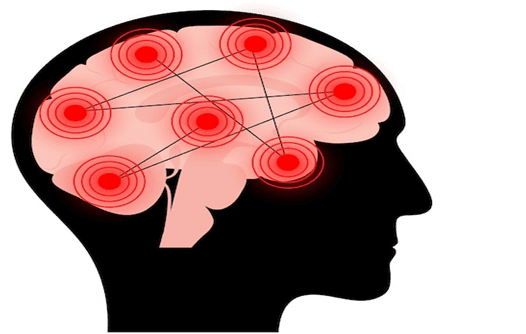
Some of the major causes of seizures in Alzheimer’s may include:
1. Brain Cell Damage:
Alzheimer’s disease damages brain cells. It disrupts regular electrical activity, which can trigger seizures.
2. Neurochemical Changes:
The disease alters the balance of chemicals in the brain, such as neurotransmitters. This makes it more prone to seizure activity.
3. Brain Atrophy:
As Alzheimer’s progresses, brain atrophy (shrinking) occurs. It may contribute to the onset of seizures.
4. Plaque Formation:
The accumulation of amyloid plaques, a hallmark of Alzheimer’s, can interfere with brain signals and lead to seizures.
5. Genetic Factors:
Specific genetic mutations associated with Alzheimer’s may also increase the risk of seizures.
6. Medication Interactions:
Sometimes, medications used to treat Alzheimer’s or other conditions can lower the seizure threshold.
Now, let’s explore how seizures in Alzheimer’s are managed.
Treatment for Seizures in Alzheimer’s Patients

Alzheimer’s seizures treatment is continuously evolving. Specialists like Dr. Gurneet Singh Sawhney, a renowned neurosurgeon in Navi Mumbai and Mumbai, are pioneering individualized therapies. The focus is always on enhancing the patient’s quality of life.
Treatment options for seizures in Alzheimer’s patients include:
1. Medication Management:
The primary treatment is anti-seizure medications. Experts tailor these medications based on the patient’s medical history and the nature of their seizures.
2. Lifestyle Modifications:
A healthy lifestyle, including a balanced diet and regular exercise, can help manage seizures. Adequate sleep and stress reduction are also vital.
3. Regular Monitoring:
Regular check-ups with a specialist are essential. They can monitor the effectiveness of treatment and make adjustments as needed.
4. Cognitive Therapy:
Cognitive therapies can help in managing the impact of Alzheimer’s. It can help reduce the frequency or intensity of seizures.
5. Innovative Therapies:
In some cases, doctors may consider treatments like vagus nerve stimulation (VNS) or deep brain stimulation (DBS), especially if seizures are difficult to control.
6. Supportive Care:
A strong support system, including family involvement and professional caregiving, is essential for overall well-being.
Are you seeking specialized seizures and Alzheimer’s treatment in Mumbai? Find out about the latest treatment approaches. Click here for more details and to schedule a consultation.
Now, let’s see the effects of seizures on Alzheimer’s patients.
The Impact of Seizures on Alzheimer’s

The impact of seizures on Alzheimer’s disease is significant and multifaceted. When a person with Alzheimer’s experiences seizures, it often signals a more advanced stage of the disease. Seizures in Alzheimer’s patients can accelerate cognitive decline. It makes symptoms like memory loss, confusion, and disorientation more pronounced. This exacerbation occurs because seizures disrupt the normal functioning of the brain, which is already compromised by Alzheimer’s.
Moreover, managing seizures in Alzheimer’s patients can be challenging. The use of antiepileptic drugs, commonly prescribed for seizures, needs careful consideration. These medications can interact with Alzheimer’s medicines. It can potentially affect their efficacy or cause unwanted side effects. The balancing act between managing seizures and Alzheimer’s symptoms requires careful medical attention.
Importantly, seizures can also impact patients’ and caregivers’ overall quality of life. They bring an added layer of complexity to care. It often requires additional medication, increased supervision, and, sometimes, lifestyle changes to ensure safety. Regular monitoring and adjustments in treatment plans are essential to address the evolving nature of both conditions.
But how are these seizures in Alzheimer’s patients diagnosed? Let’s see.
Diagnosis of Seizures in Alzheimer’s Patients
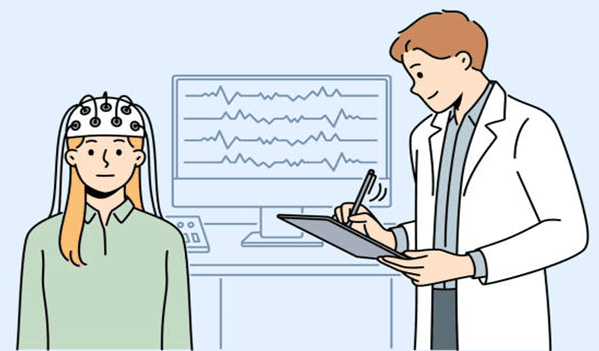
Detecting seizures in Alzheimer’s patients involves a careful and comprehensive approach:
1. Medical History Review:
Your doctor will review your medical history. They will focus on any symptoms that suggest seizure activity. This may include episodes of unresponsiveness or involuntary movements.
2. Neurological Examination:
A detailed neurological exam helps assess brain function. It also helps identify any neurological deficits related to seizure activity.
3. Electroencephalogram (EEG):
This is a crucial test. An EEG records the electrical activity of your brain. It is particularly effective in identifying seizure-related changes, even between episodes.
4. Brain Imaging:
Techniques like MRI or CT scans can provide detailed images of your brain. These assist in ruling out other causes of symptoms and looking for brain changes indicative of Alzheimers and seizures activity.
5. Blood Tests:
Sometimes, your doctor may recommend blood tests. They help detect any underlying metabolic or genetic factors contributing to seizures.
6. Observation of Symptoms:
Sometimes, a seizure diagnosis is based on observing specific symptoms that follow a typical pattern.
Remember, each individual’s situation is unique. It is essential to consult an expert like Dr. Gurneet Singh Sawhney, a seasoned neurosurgeon in Mumbai, for a precise diagnosis and treatment plan.
Ready to take the next step in managing Alzheimer’s and seizures? Reach out for expert guidance.
Conclusion
Understanding the connection between Alzheimer’s and seizures is vital for better care and patients’ well-being. Dr. Gurneet Singh Sawhney’s approach to Alzheimer’s and seizures focuses on personalized, comprehensive care. He tailors each treatment plan to address cognitive and physical symptoms. This helps improve patients’ well-being and potentially slows disease progression.
Schedule a consultation with Dr. Gurneet Singh Sawhney, a reputed neurosurgeon in India, for support and guidance on managing Alzheimer’s and seizure-related challenges.
FAQ
1. Are seizures and Alzheimer’s related?
Yes. Seizures and Alzheimer’s are related. As Alzheimer’s progresses, it can lead to changes in the brain. They can increase the chances of seizures. Patients and caregivers must be aware of this link.
2. Why do Alzheimer’s patients experience seizures?
Alzheimer’s patients experience seizures primarily due to the changes in the brain caused by the disease. These changes disrupt regular brain activity. This makes the brain more susceptible to seizures. It is a crucial aspect of the disease’s progression.
3. What does it mean when an Alzheimer’s patient has seizures?
When an Alzheimer’s patient has seizures, it often indicates a progression in the disease. Seizures in Alzheimer’s patients can exacerbate cognitive decline. So, it is essential to manage them effectively.
4. Can seizure medications interfere with Alzheimer’s treatment?
Seizure medications can sometimes interfere with Alzheimer’s treatment. It is vital to consult a specialist to ensure the treatments for both conditions are balanced and effective.
5. What stage of Alzheimer’s is seizures?
Seizures are more common in the later stages of Alzheimer’s. They are a sign that the disease is affecting more extensive brain areas. It leads to increased neurological complications.
6. Can Alzheimer’s disease cause seizures?
Alzheimer’s disease can cause seizures. As the disease progresses, it leads to brain changes that can trigger seizure activity. Monitoring and treating these seizures are a critical part of managing Alzheimer’s.
